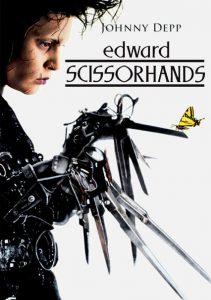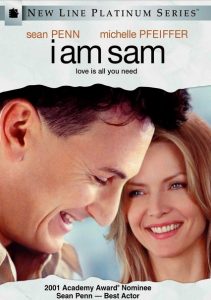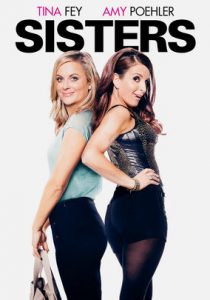Edward Scissorhands-1990
Director Tim Burton
Starring Johnny Depp, Winona Ryder, Dianne Wiest
Scott’s Review #1,198
Reviewed November 20, 2021
Grade: B+
Edward Scissorhands (1990) is a Tim Burton creation, given appropriate funding only after the smash success of his 1989 film Batman. A creative and romantic fantasy, it is an unconventional project made as charming and whimsical as its stars were at that time.
The film is part sad, part magical, with enough science fiction and romance sprinkled in to make it work across genres. The result was another box office hit for Burton, teen idol status for its lead stars, and an obvious Academy Award nomination for the deserving Makeup department.
As unconventional and original as it appears on the surface the film suffers slightly from being a bit mainstream. There is a safe, romantic comedy feel that takes the film away from a much darker tone it could (and should) have had.
Still, Edward Scissorhands is entertaining and fascinating.
An eccentric scientist, deliciously played by Vincent Price, builds an animated human being, the gentle and soft-spoken Edward (Johnny Depp). He dies before he can finish assembling Edward, leaving the poor young man with a freakish appearance accentuated by the scissor blades he has instead of his hands.
Friendly suburban saleswoman Peg (Dianne Wiest) discovers Edward and takes him home, where he falls for Peg’s teen daughter Kim (Winona Ryder). However, Edward’s hands make him an outcast despite his kindness and artistic talent.
This is a challenge for all of them.
By 1990 Johnny Depp was becoming a huge Hollywood star and so was Winona Ryder. As the ‘it’ actors, this helps Edward Scissorhands tremendously by not only adding ticket sales but also a fascination with them as a couple.
The chemistry is palpable and so is the classic good girl helping boy reform. Depp’s Edward is a sympathetic hero and is instantly mysterious and likable.
Wiest, then in her prime, is a hoot as the comical Avon lady who introduces Edward to the joys and pains of suburban Americana. Particularly enjoyable are the perfectly manicured landscapes in Peg’s neighborhood where she goes door to door selling her products.
As one can easily predict, the beautiful plants and bushes suffer from Edwards’s dangerous hands.
The Gothic mansion where Peg discovers Edward is a deliciously creative set piece that has the classic Burton stamp. The director is so defined by his artistic sets and design that half the fun of the film is discovering and noticing these fabulous creations.
The mainstream part comes with the story and a smattering of 1982’s E.T. sentimentality included to win over middle-American audiences. This isn’t bad but it does lighten the heavy drama and sinister approach that Burton could have honed in on.
Much of the credit must go to Depp because on paper the premise could easily be dismissed as silly, trivial, or outlandish. The actor brings pathos to the role and makes the audience believe in and fall in love with the character.
He makes Edward even more rootable by adding some obvious cliches- Kim’s jealous boyfriend Jim, played by Anthony Michael Hall, and the eccentric religious fanatic who believes that Edward is evil incarnate, played by O-Lan Jones.
Adding these villains and most of the rest of the neighborhood as either clueless or misunderstanding townsfolk adds to the reduction of most of the supporting cast to standard stock characters.
Burton, along with Depp, Ryder, and Wiest, gives Edward Scissorhands (1990) heart.
It’s a beautiful fairy tale that feels magical and adventurous save for some mediocre storytelling. It’s an above-average film that won over the masses at the time of release.
Oscar Nominations: Best Makeup



